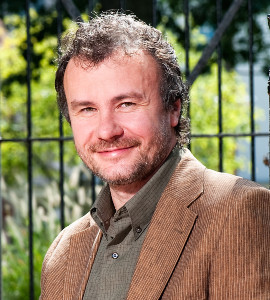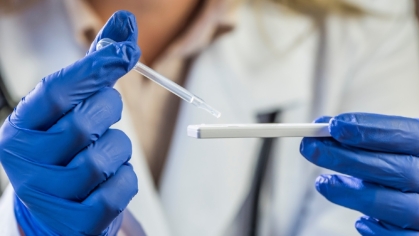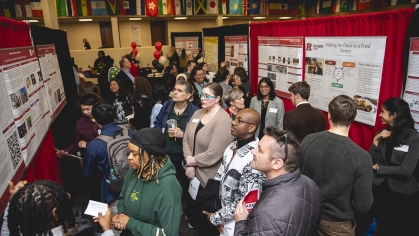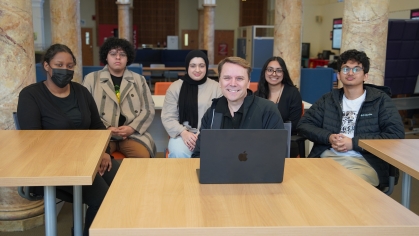Researchers Study Virus Evolution Trends Relevant for COVID-19 and Other Pandemics
One year after the first COVID-19 case was reported, researchers and medical professionals continue to learn more about the virus that causes it.
Through a $188,253 National Science Foundation grant, Rutgers University‒Camden researcher Andrey Grigoriev is studying the RNA genome of the coronavirus behind COVID-19 – and trying to anticipate how to combat its mutations in the future.
“Viruses undergo frequent mutations, and the worldwide effort of sequencing the RNA of thousands of coronavirus isolates allows us to analyze them using computational methods,” says Grigoriev, a Rutgers‒Camden professor of biology. “We search for the regions in the SARS-CoV-2 coronavirus genome that mutate rarely and try to understand what the reasons for such stability of these regions are.”
Research conducted by the Rutgers–Camden team, which includes undergraduate and graduate students, could help shed light on how to combat COVID-19 and how the virus can spread.
“We all know about comorbidities and old age as significant factors,” Grigoriev says. “But there are also likely genetic reasons for disease severity outside these risk groups. Certain variants in our own genes may make us more or less susceptible to a coronavirus infection, just as other variants might affect our chances in another disease.”
Work in Grigoriev’s lab includes searching for and interpreting variants in many genomes, including viruses and their hosts.
Mutations in the viral genes can lead to drug resistance and this could potentially happen to vaccine-induced antibodies too, Grigoriev says.
“A retrospective analysis was published for another coronavirus (a benign one, causing the common cold), testing patients’ antibodies in samples collected over many years versus the older and newer virus isolates. In these years the virus had evolved and its recent isolates could not be efficiently neutralized by the antibodies in patients’ samples from earlier years,” explains the Rutgers–Camden researcher.

Andrey Grigoriev
Grigoriev says the spike protein that allows SARS-CoV-2 to attach to human cells is the focus of all current vaccines but it undergoes mutations frequently. He adds that if researchers could identify selective forces that make mutations in another gene occur less often, such a gene might be an ideal target for next-generation treatments.
“We are looking a few steps ahead in this battle with the virus,” the Rutgers‒Camden scholar explains. “Coronaviruses have been infecting people and animals for many years, and we only learned about the deadly representatives of this virus family 18 years ago. Sadly, new coronaviruses are very likely to come along again. The good news is that despite their different pathogenicity, the members of this family have similar biology. If we can understand it in detail now, we will be more prepared for another possible pandemic.”
A researcher for more than three decades in computational biology and bioinformatics, Grigoriev has published several papers on viral genomes and is teaching a course on coronaviruses this semester. Since there are no textbooks covering the most recent developments, he compiles information from current research papers and his lab’s own results to use as course materials. He is the founding director of the Center for Computational and Integrative Biology at Rutgers University–Camden.
The NSF Rapid Response Research grant funds proposals that require quick-response research on disasters and unanticipated events, such as the COVID-19 pandemic.
“I am honored to be a part of a global team of researchers solving the puzzles this virus presents, however grim these puzzles are,” Grigoriev says.



